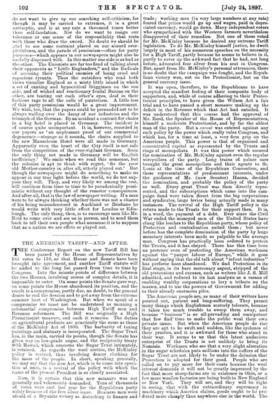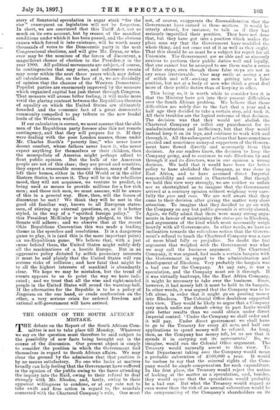THE AMERICAN TARIFF—AND AFTER. T HE Conference Report on the new
Tariff Bill has been passed by the House of Representatives by 185 votes to 118, so that House and Senate have been brought into agreement, and another Tariff statute will be added to the long list passed from time to time by Congress. Into the minute points of difference between the two Houses, involving scores of complex details, it is impossible to enter. On some points the Senate gave way, on some points the House abandoned its position, and the result is a compromise, partly due, no doubt, to the general desire to end the Session and to get away from the extreme summer heat of Washington. But when we speak of a compromise we must not be understood as meaning a substantial compromise between High Tariff men and Revenue reformers. The Bill was originally a High Protectionist measure, and. such it remains. The duties on agricultural products are practically the same as those of the McKinley Act of 1890. The barbarity of taxing paintings and statuary is incorporated. The Sugar Trust has, in the main, carried its points, though the Senate has given way on low-grade sugar, and the reciprocity treaty with Hawaii, which concerns the Sugar Trust intimately, is retained. As regards the wool section, the McKinley policy is revived, thus involving dearer clothing for the mass of the people. In short, speaking generally, we may say that the new Act, which is to come into opera- tion at mice, is a revival of the policy with which the name of the present President is so closely associated.
Now, it is certain that this new measure was not generally and vehemently demanded. Tens of thousands of votes were cast last year for the Republican party solely because of the free silver issue. Business men were afraid of a Bryanite victory as disturbing to finance and. trade ; working men (in very large numbers at any rate) feared that prices would go up and wages, paid in depre- ciated currency, would go down. Many independent voters who sympathised with the Western farmers nevertheless disapproved of their remedies. Not one of these voted for Mr. McKinley because he desired any extreme Tariff legislation. To do Mr. McKinley himself justice, he dwelt largely in most of his numerous speeches on the necessity for a High Tariff, partly because he seems to believe in it, partly to cover up the awkward fact that he had, not long before, advocated free silver from his seat in Congress. But, apart from Mr. McKinley's personal utterances, there is no doubt that the campaign was fought, and the Repub- lican victory won, not on the Protectionist, but on the general currency issue.
It was open, therefore, to the Republicans to have accepted the manifest feeling of their composite body of supporters, and, while of course adhering to their Protec- tionist principles, to have given the Wilson Act a fair trial and to have passed a short measure making up the deficit in the Revenue which that Act had entailed. It was understood that this course had the approval of Mr. Reed, the Speaker of the House of Representatives, himself a moderate Protectionist, and. by far the ablest man of the party. But a caveat was entered against any such policy by the power which really rules Congress, and which has, for a time at least, a very firm grip on the American people. This power is that of organised and. concentrated capital as represented by the Trusts and rings of monopolists. It was this power which secured the nomination of Mr. McKinley against even the regular wirepullers of the party. Long trains of palace cars brought the great monopolists and their agents to St. Louis at the time of the Republican Convention, and. these representatives of predominant interests, under the guidance of Mr. (now Senator) Hanna, decided the nomination, and probably the policy of the party as well. Every great Trust was then directly repre- sented, and the subscriptions which came into the cam- paign fund. were taken direct from the big corporations and syndicates, large levies being actually made in many instances. The revival of the High Tariff policy is the return made to the Trusts for their support then. It is, in a word, the payment of a debt. Ever since the Civil War ended the moneyed. men of the United States have clung like leeches to the Republican party, whose policy of Protection and centralisation suited them ; but never before has the complete domination of the party by huge monetary interests been made so palpable to the average man. Congress has practically been ordered to protect the Trusts, and it has obeyed. There has this time been no pretence even of protecting the American workmen against the "pauper labour of Europe," while it goes without saying that the old talk about "infant industries" has perforce been abandoned. We find Protection in its final stage, in its bare mercenary aspect, stripped. of the old pretensions and excuses, such as writers like J. S. Mill admitted, and reduced. to its last analysis as a means of enabling wealthy corporations to levy a tribute on the masses, and to use the powers of Government for adding to their already enormous piles.
The American people are, as many of their writers have pointed out, patient and long-suffering. They permit many things which Englishmen scarcely tolerate, because it takes too much trouble to sweep them away, and. because " business " is so all-pervading and omnipotent that few find* time to make the public weal their own private cause. But when the American people do rise they are apt to be swift and sudden, like the cyclones of their prairies, and. it is awkward for those who stand in their way. It seems to us that this latest audacious enterprise of the Trusts is not unlikely to bring its Nemesis. Workmen who see that a very slight alteration in the sugar schedules puts millions into the coffers of the Sugar Trust are not likely to be under the delusion that Protection is adopted for their good. People who are called on to pay more for their coats because the wool interest demands it will not be greatly impressed by the fact that more sheep-farms are in existence in Ohio, or a few more woollen faetories are being built in New England. or New York. They will see, and they will be right in seeing, that with the extraordinary supremacy in machinery which America claims, goods ought to be pro- duced more cheaply than anywhere else in the world. The story of Senatorial speculation in sugar stock "for the rise" consequent on legislation will not be forgotten. In short, we are convinced that this Tariff Act, not so much on its own account, but by reason of the manifest conditions under which it has been passed, and the obvious causes which forced it into existence, will be worth many thousands of votes to the Democratic party in the next Congressional elections, and will give Mr. Bryan, or who- ever may be the nominee of the forces of discontent, a, magnificent chance of election to the Presidency in the year 1900. All political movements are subject, of course, to contingencies that may arise, and unforeseen events may occur within the next three years which may defeat all calculations. But, on the face of it, we are decidedly of opinion that the chances of the Western Democratic- Populist parties are enormously improved by the measure which organised capital has just thrust through Congress. That measure will arouse bitter feeling, it will make more vivid the glaring contrast between the Republican theories of equality on which the United States are ultimately founded and the economic fact of a great democratic community compelled to pay tribute to the new feudal lords of the Western world.
If our calculation is correct, we must assume that the able men of the Republican party foresee also this not remote contingency, and that they will prepare for it. If they were dealing with the poor London masses, those under Mr. Charles Booth's "poverty line," who never knew decent comfort, whose fathers never knew it, who never expect anything for themselves or their children, then the monopolists of America might perhaps afford to flout public opinion. But the bulk of the American people are not of this class ; they are proud and sensitive, they expect a reasonable economic chance, many of them left their homes, either in the Old World or in the older Eastern States, to secure it. They will be in the rebellious mood, they will not acquiesce, we venture to predict, in being used as means to provide millions for a few rich men ; and those rich men, we must assume, will be aware of this in a general way. How, then, will the forces of discontent be met ? We think they will be met in the good old familiar way, known to all European states- men, of stirring up external questions, or, as it is better styled, in the way of a "spirited foreign policy." To this President McKinley is largely pledged, to this the Senate will adhere ; and we observe that at the recent Ohio Republican Convention this was made a leading theme in the speeches and resolutions. It is a dangerous game to play, it is (and this is the more important point) an un-Republican game. We believe that, with a just cause behind them, the United States might safely defy all the machinations of a hostile Europe. But in an aggressive policy dictated by selfish pecuniary interests it must be said plainly that the United States will run serious risks of collision ; and how fatal that might be to all the highest interests of mankind is abundantly clear. We hope we may be mistaken, but the trend of events appears to us to point the way we have indi- cated; and we trust that all the wise and right-minded people in the United States will sound the warning-bell. If the alternative for the Republic is to be a policy of Jingoism on the one hand, or crude confiscation on the other, a very serious crisis for ordered freedom and rational self-government will have arrived.



































 Previous page
Previous page